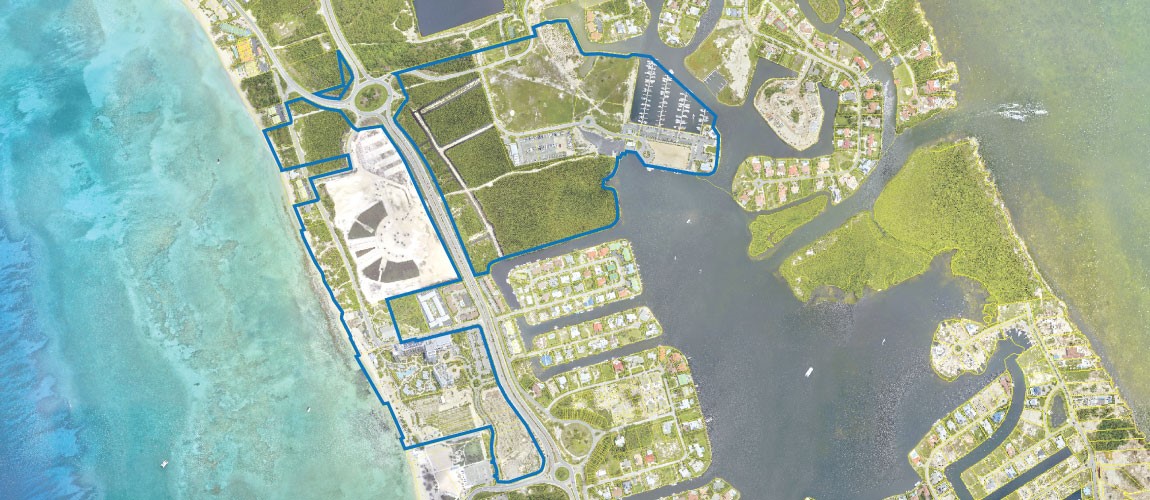
Grand Cayman, 30 July 2021: In February 2021, Dart submitted a Planned Area Development (PAD) application for a resort residential district in the Seven Mile Beach corridor, north of Governor’s Harbour, consistent with and adjacent to existing hotel and tourism areas including Kimpton Seafire Resort + Spa, the Cayman Islands Yacht Club, restaurants and condominiums.
Subsequently, Dart held 10 stakeholder meetings with more than five hundred neighbouring residents, Government representatives and staff, along with public and private associations to improve awareness and understanding of the application and further illustrate Dart’s approach to sustainable development.
Fundamentally, a PAD is a rezoning exercise that promotes sustainable development by considering long term land use, accessibility, infrastructure, public spaces and environmental management. It does not, and cannot, give permission to build or to alter the land, and any physical development which may be contemplated within the PAD area would require a separate application for planning permission for such development, through the normal planning process, which includes all the usual notifications to the public and the requisite consultation with specific government agencies, the Department of Environment (DoE) and the National Conservation Council.
Dart’s PAD application categorically did not and, legally speaking, cannot seek to alter beach access, or remove 42 acres of mangrove, or remove beach rock, as has been erroneously reported in the media. Public confusion seems to be caused primarily by the conflation of the PAD approval process with the application for planning permission process, which are two fundamentally different processes.
The DoE reviewed the PAD application and produced a 24-page Screening Opinion on 19 April 2021, which contained its unilateral conclusion that the PAD application required an environmental impact assessment (EIA). By letter dated 9 April 2021 the National Conservation Council supported the DOE’s conclusion that an EIA was required. As far as Dart is aware, no other PAD application submitted to the Central Planning Authority (CPA) has required an EIA as a pre-requisite to hearing the application. Further, the CPA has, to date, not approved any PAD application with the requirement to conduct a comprehensive EIA.
Dart is supportive of the EIA process. However, not only is an EIA not mandated by law for a PAD application, any EIA which is done prior to the planning permission process would be premature and of limited relevance. Unlike an application for PAD approval (which is simply seeking approval of an alternate and more comprehensive zoning map and zoning rules), the planning application process requires specificity of final design concepts for a proposed development that enables the EIA to properly and accurately assess specific environmental impacts.
The PAD application, in and of itself, does not propose to permit any form of physical development. Consequently, it is impossible to attempt to assess the environmental impact. However, what one should bear in mind is that much of the proposed PAD area is already zoned so as to permit 10-storey hotel and tourism-related developments. Therefore, the proposed PAD does not contemplate any development that exceeds current parameters.
In addition, in Dart’s opinion, there have been a number of inaccuracies in recent reports made about the PAD application. This may be because the DOE Screening Opinion contains a number of assumptions, incorrect information and data, while also considering irrelevant matters which were not part of the application and were never intended to form part of the PAD.
For clarity, Dart’s PAD application is not an application for permission to develop or alter land. To undertake those activities requires a separate planning application and follows an entirely separate process. It is therefore difficult to see how the approval of a PAD could have any consequential impact on the environment, especially as the majority of the land is already zoned for Hotel and Tourism related developments. Consequently, it appears the conclusion reached in the DOE Screening Opinion, which appears to have been ratified by the NCC, is fundamentally flawed. Further, what is important to note is that the NCC appears to have delegated their decision-making capacity to the DOE in breach of the respective law.
Given the apparent confusion surrounding its PAD application, Dart felt it necessary to illustrate the errors and inconsistencies within the Screening Opinion and the PAD application process as a whole, which fueled recent incorrect reports and comments.
“We are concerned about the inconsistency in the interpretation and application of the current law when determining at what stage an EIA is required. This inconsistency and lack of clarity in the law relating to the requirements for a PAD has led to what appears to be incorrect and unfounded conclusions, which in turn led to misinformation and confusion,” said Mark VanDevelde, Dart Chief Executive Officer. “We are of the view that all stakeholders would be better served with clear, consistent requirements set out in a set of updated, comprehensive and synchronised legislation. This is urgently needed to bring efficiency and predictability to the process and to balance the country’s environmental, social, and economic interests.”
“On one end of the spectrum, there are lands and habitats of significant environmental importance which absolutely need to be protected, and on the other end of the spectrum, there are lands which, if developed, can provide the greatest economic benefits to the country. In the middle, where the value is not as clearly defined, having such a framework would be invaluable to guide decision making. A comprehensive Environmental Management Framework informed by all stakeholders, that reflects a shared vision for the future, would provide clear guidance on how land can be developed, managed or protected, and give much-needed certainty and clarity to all parties,” he concluded.
Dart looks forward to discussing these concerns with the respective Government agencies to move this matter forward.
END
For media enquiries, please contact Hannah Reid, Public Relations Manager at Dart, at hannah.reid@dart.ky or + 1 (345) 325 3311.
In other news